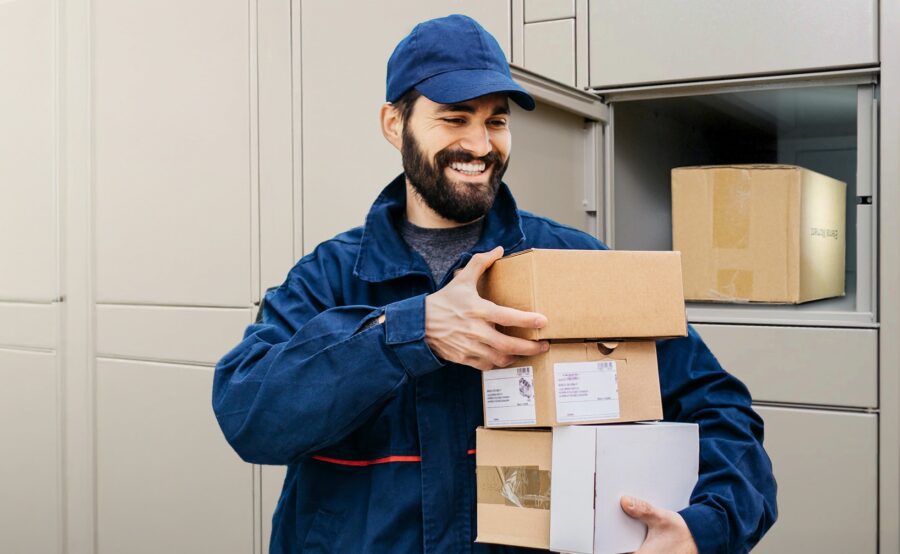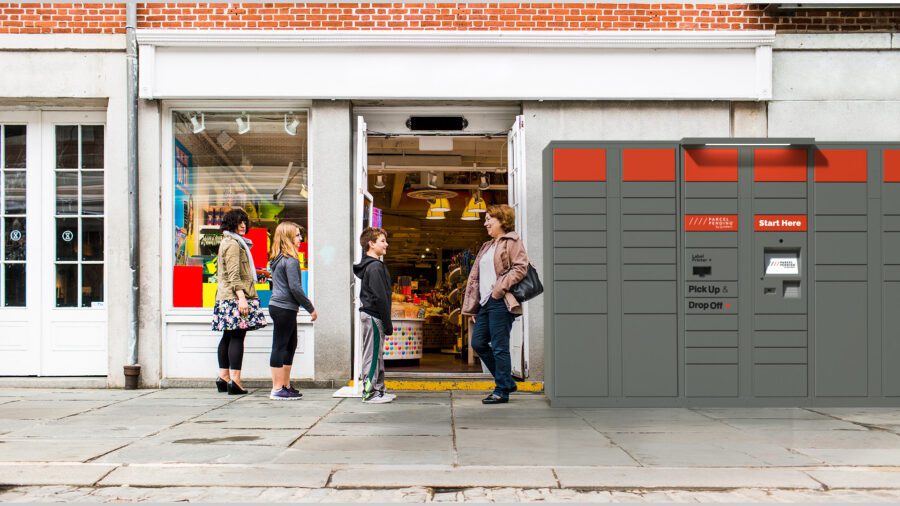
Open Locker Network
The Rise of Supermarkets as Multi-Service Hubs: Why Parcel Lockers Are the Missing Piece
Written by: Parcel Pending
6 Min Read
Published: September 10, 2025
Supermarkets have always been a cornerstone of everyday life in the UK. For many households, they’re a weekly ritual – a place to do the ‘big shop’ or pick up a few essentials. But in recent years, their role has been shifting.
Today’s supermarkets are no longer just about groceries. They are evolving into multi-service destinations, offering everything from healthcare and banking to fresh coffee, travel money services, and even electric vehicle (EV) charging.
This shift reflects bigger changes in the way people shop. The growth of online retail has reduced the need for some in-store purchases, while discounters continue to keep price competition tight. In response, many grocery retailers are rethinking how their physical stores can serve customers – not only as places to shop, but as locations where a wide range of everyday needs can be met. By expanding in this way, they give customers more reasons to visit, stay longer, and return more often.
Beyond the weekly shop
Walk into any large supermarket today and you’re likely to find much more than food. Pharmacy services, for example, are now commonplace across the big four – Tesco, Asda, Sainsbury’s, and Morrisons – helping customers collect prescriptions or get advice without making a separate trip.
Travel money has also become part of the mix. In-store currency exchange counters allow shoppers to pick up travel money alongside their groceries, adding an extra layer of convenience.
Supermarkets are also teaming up with well-known food and drink brands to expand their in-store offering. From coffee machines to hot food concessions, these partnerships provide shoppers with more choice while increasing time spent in store. Whether it’s a quick espresso from a Costa Express machine or a hot snack from a Greggs counter, these additions make the store a more appealing destination.
Banking is following a similar pattern. With more and more high street bank branches shutting their doors1, an increasing number of supermarkets are filling the gap with additional in-store ATMs and shared banking spaces2,3. For communities where access to financial services is becoming more limited, having these facilities alongside food shopping offers real value.
Powering up: EV charging
Perhaps the clearest example of supermarkets broadening their offer is the rapid rollout of EV charging. Supermarket car parks are increasingly being reconfigured to host rows of chargers for the UK’s growing fleet of electric vehicles.
According to a 2024 report by Zapmap, more than one in ten supermarkets now provide EV charging, with nearly 3,000 charging devices installed by the end of 2023 nationwide – a 69% increase in just one year4. Rapid and ultra-rapid chargers are growing the fastest, with supermarket locations now hosting 10% of the UK’s quickest charging points.5
Retailers are also starting to connect electric vehicle charging to their loyalty schemes. Tesco customers, for example, can earn Clubcard points when they charge6, while Sainsbury’s has linked its Smart Charge network to Nectar7.
For customers, the benefit is clear: top up the car, do the weekly shop, collect a prescription, and maybe grab a coffee – all in a single visit. For supermarkets, it’s an effective way to attract customers who might otherwise charge elsewhere and encourage them to spend more time in store while they wait.
Why additional services matter
The thinking behind this strategy is simple: the more reasons customers have to visit, the more central the supermarket becomes in their daily lives. A store that doubles as a pharmacy, café, travel money counter and EV charging hub isn’t just a place to shop, it’s a place people can rely on for multiple needs.
Convenience is the strongest motivator. Shoppers are looking for ways to save time by combining errands into a single trip. Parents value being able to collect prescriptions during the weekly shop, commuters appreciate being able to pick up travel money on their way home, and older customers benefit from the ease of having services in one familiar location.
There’s also a wider community impact. With bank branches, post offices and other local services closing8,9, supermarkets are stepping in to provide some of what’s disappearing from high streets. That makes them not only retail destinations but vital community hubs – places where everyday services remain accessible close to home.
Sustainability plays a role too. EV charging supports the UK’s net zero ambitions and helps customers transition to greener travel. By providing the infrastructure, supermarkets can take a practical role in supporting positive environmental change.
The missing piece: parcel lockers
Alongside these services, there is another opportunity that many supermarkets have yet to fully embrace – open network parcel lockers.
The rise of e-commerce has made parcel delivery a part of everyday life, but it has also created new challenges. With UK online retail sales reaching a record £127 billion in 202410 and online sales continuing to climb, there is a growing demand for more flexible delivery and return options. Against this backdrop, missed deliveries, a limited number of collection points and the hassle of returns are increasingly common frustrations among consumers. Smart parcel lockers can offer a simple, secure solution.
For shoppers, lockers mean flexibility. They can collect or return parcels at a time that suits them, 24/7, day or night, without queuing at a collection point or being limited by store opening hours. For busy households, that freedom can make a big difference.
For retailers hosting an open network locker, the benefits extend beyond convenience for customers – lockers can also drive additional footfall and encourage incremental spend. A customer visiting to pick up or return a parcel may also pop in store to grab a few essentials or stop for a coffee while they’re there. Over time, those extra purchases contribute real value.
Lockers also help bridge the gap between online and offline shopping. Just as pharmacies, cafés and EV chargers have become integrated into the supermarket visit, lockers bring e-commerce into the same space, creating a seamless link between digital and physical retail.
Looking ahead
Supermarkets are already well on the way from grocery retailers to multi-service hubs. Pharmacies, banking, food concessions and EV charging are proof of how quickly that transformation is taking place.
Open network parcel lockers are the natural next step – a service that complements existing concessions while strengthening the supermarket’s role as trusted neighbourhood destinations. For supermarkets, hosting lockers is a small addition that can deliver great value: blending the best of physical retail with the flexibility of digital, while offering customers and communities an even more convenient, connected experience.
Ready to explore how smart parcel lockers could add value to your store? Speak with a Parcel Pending by Quadient representative today to find out how you can join our nationwide Open Locker Network and unlock new opportunities.
Sources
1. Which? Over 6,000 bank branches closed since 2015 and counting. www.which.co.uk. May 17, 2024.
2. Talking Retail. Morrisons launches UK’s largest non-bank cash deposit ATM network. www.talkingretail.com. August 26, 2025.
3. The Grocer. Co-op opens ‘access to cash’ banking hub inside store. www.thegrocer.co.uk. April 29, 2025.
4. Zapmap. Super charged: More than one-in-10 UK supermarkets now offer EV charging. www.zap-map.com. March 22, 2024.
5. Ibid.
6. Pod Point. Collect Tesco Clubcard points for charging your vehicle. www.pod-point.com. n/d.
7. Sainsbury’s. EV industry first: Smart Charge from Sainsbury’s introduces Nectar points to reward customers for electric vehicle charging. www.corporate.sainsburys.co.uk. June 12, 2024.
8. BBC. Post Office could close 115 branches with jobs at risk. www.bbc.co.uk. November 12, 2024.
9. TimeOut. Full list of UK high street closures confirmed in 2025, including Poundland, Morrisons, WH Smith, Homebase, New Look and more. www.timeout.com. August 13, 2025.
10. Retail Gazette. Data: UK online retail sales hit record £127bn in 2024. www.retailgazette.co.uk. February 12, 2025.



